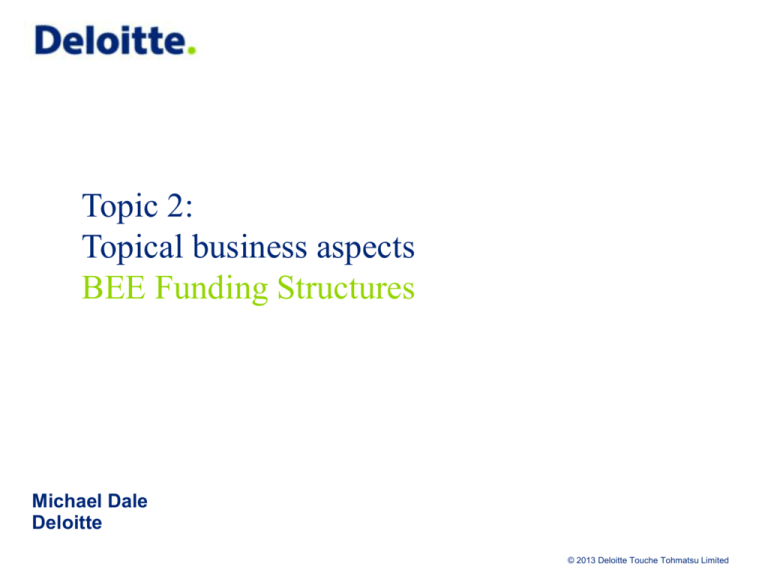
Topic 2:
Topical business aspects
BEE Funding Structures
Michael Dale
Deloitte
© 2013 Deloitte Touche Tohmatsu Limited
Contents
Section
Page
Contents
2
Introduction
3
Typical structures
4
Key considerations
6
Payoffs – In or out of the money?
9
Technical talk
10
Key observations & conclusion
11
2
Introduction
Broad-Based Black Economic Empowerment
Broad-Based Black Economic Empowerment
Background
Ownership
• The South African Government has passed legislation since 1994
to promote Black Economic Empowerment (“BEE”), which is a
policy aimed at including Previously Disadvantaged Individuals
(“PDIs”) into the mainstream economy of the South Africa
•
The focus of this presentation is on the Corporate Finance
considerations in respect of the Ownership Element of the BEE
Scorecard
•
The area of BEE ownership is relatively technical and has evolved
over the last 10 years
•
Funding for these transactions is typically structured in various
shapes and forms (Bank Funded or Vendor Funded or a
combination of both)
•
The essence of the payoffs attached to typical BEE structures can
be compared to that of call options and falls firmly in the space of
derivative and option pricing valuations
•
• Management Control – top management positions held by PDIs
with management decision making rights in an organisation;
The principle of BEE has been reaffirmed by the South African
Government and is gaining traction on the African continent, with
other African countries considering South African BEE as a
template on which to build their own local empowerment
framework
•
• Employment Equity – black employees as a percentage of staff
in a company;
Ownership credentials are a primary focus and impact on a
company’s ability to operate effectively in the local environment
•
The Ownership Element can be contentious with large values at
stake and the challenges of achieving a balance between national
interests and shareholders interests
•
Most structures are developed on the assumption of an increasing
value of the Empowered Company
• The foundation of BEE is the Broad-Based Black Economic
Empowerment Act 53 of 2003 (the “BEE Act”), and the Codes of
Good Practice promulgated under it (the “Codes”). The BEE Act
and the Codes are administered by the Department of Trade and
Industry
• The BEE Act and Codes employ a balanced scorecard to assess
an entity’s compliance with BEE. The scorecard assigns various
weightings to each Element, and an entity’s BEE compliance is
determined according to these weighted scores
• The Elements of the BEE Scorecard are:
• Ownership – ownership in a company by PDIs;
• Skills Development – investment in training of black employees;
• Preferential Procurement – purchases from organisations with
good BEE ratings;
• Enterprise Development – developing and supporting small
black owned businesses;
• Socio-Economic Development – donation of goods, services
and money to qualifying non-profit organisations
3
Typical structures – Bank Funded
Ownership – Bank Funded Structure
Ownership – Bank Funded Structure
Salient points
Shareholding of 25.1 percent
• Bank provides funding into BEE structure, say R100m
• Can be by way of Preference Shares or another form
• Cash flows through the BEE SPV into the Empowered Company
Bank
• Empowered Company issues 25.1 percent Ordinary Shares to
BEE SPV
R100m
• Bank provides a cash flow / asset based lend, depending on the
underlying fundamentals of the Empowered Company
• Bank may require guarantee / security from the underlying
Empowered Company in terms of recourse to the balance sheet of
the Empowered Company
Existing
shareholders
• Empowered Company receives the cash and can utilise it to fund
and grow its operations
25.1
%
R100m
Empowered
Company
• Principal increases by interest expense and is reduced by dividend
income
• BEE deal is subject to a lock in
• 3 Parties to the Agreement - BEE SPV, Empowered Company and
Bank integral to the negotiation
• BEE SPV participates in voting rights and economic benefit of the
Empowered Company
BEE SPV
74.9
%
• Funding is priced by credit terms, collateral and underlying
fundamentals of the Empowered Company with BEE credentials in
place
Pref
Shares
4
Guarantee
or security
Typical structures – Notional Funded
Ownership – Notional Funded Structure
Ownership – Notional Funded Structure
Salient points
Shareholding of 25.1 percent
• No funding required by the Bank, as the transaction is vendor
funded by the Empowered Company
• Notional Funding Agreement entered into for, say R100m Notional
Funding Loan
• Nominal cash flows with the balance forming part of the Notional
Funding
• Empowered Company issues 25.1 percent “A” Ordinary Shares to
BEE SPV
• Funding is not reliant on cash flow / asset based lend as
shareholders of the Empowered Company carry the economic cost
directly
• No guarantee / security required from the underlying Empowered
Company
• Empowered Company does not receive cash other than nominal
amount
• Funding is priced by negotiation and commercial terms in respect
of typical BEE funding
• Notional Principal increases by notional interest expense and is
reduced by notional dividend income, and is unwound by way of a
share buy back at termination
• BEE deal is subject to a lock in
• 2 Parties to the Agreement - BEE SPV and the Empowered
Company are integral to the negotiation
• “A” Ordinary Shares vote and participate in economic benefit of the
Empowered Company
Existing
shareholders
BEE SPV
“A” Ord
Shares
74.9%
25.1%
Empowered
Company
5
Notional
Funding
R100m
Notional
Funding
Agreement
Key considerations
Consideration
Equity stake
Equity contribution by
BEE party
•
25 percent +1 of the voting shares of the measured entity with economic benefits
•
Consider the impact of the BEE party exiting in future
• Ranges between 0 and 25 percent in typical transactions where vendor facilitation is
negotiated
• Important demonstration of commitment – “skin in the game”
Split of equity
• Proportion of equity participation by lead/strategic BEE partner within the BEE SPV
• Proportion of equity available to employees, communities and broad based participants
Source of equity funding
• Credible bids demonstrate commitment of funds
• Important consideration in the sustainability of funded structures over the term of the
transaction
Willingness to pay equity
contribution
• Low, Medium or High – impacts on ranking bids
Price offered and
discount to VWAP
• Pricing typically benchmarked to 30, 60 or 90 day VWAP
• Market becoming competitive and ability to secure the transaction is key – this is balanced
with management style, knowledge of the industry and ability to add value
• Discounts range from 0 to 30 percent and impacted by lock in periods and equity contribution
6
Key considerations
Consideration
Lock in period
Cost of equity funding
•
3, 5 or 10 years with the norm typically in the region of 5 years
•
Longer term secures empowerment credentials and avoids refinancing costs, while the shorter
periods presents the risk of BEE party cashing out
•
Discounts and lock in periods are positively correlated
• Important to consider if the equity funding is encumbered or unencumbered?
• Do any external 3rd parties contributing to the equity funding participate in the upside, and how
much?
Cost of notional funding
• 72, 80 or 100 percent of prime lending rate, or higher?
• Is there a requirement for a minimum dividend yield to be paid from the Empowered Company
Security / ranking
• Guarantees or security required from the Empowered Company and recourse to its balance
sheet
• Ordinary Shares or “A” Shares held as security
• BEE SPV or BEE holding company provide guarantees or security to external 3rd parties and
potential risk of recourse
Positions on the board
• Consider positions on the board and the relevant contributions of board members and
qualifications
Black ownership
• Proportion of BEE SPV that is black owned and proportion of the upside that accrues to PDI’s
SA based company with
international operations
• Considerations in respect of what level to conclude the empowerment transaction with SA
based companies that have substantial international operations
7
Key considerations
Consideration
Conflicting or complimentary
assets
Complementary to
management style
•
Does the BEE SPV have conflicting or complimentary assets
•
No deal if BEE party is invested in your competitor
•
Good deal if BEE party can bring complimentary assets to the table
• Statesmen style leadership versus Entrepreneurial flair – what does the Empowered Company want
and where does the BEE party fit in?
• How is the BEE SPV managed? Consultants involvement to complement BEE’s own team or
operate independently
• Work origination from investee companies and outside
Ability to operate across a
changing political
environment
• Politically agnostic or politically aligned and the costs and benefits of each approach?
Meaningful cash resources
vs vendor funding
• Consider the level of importance of meaningful cash resources versus vendor funding
Industry knowledge
• BEE party has industry specific knowledge or is the deal opportunistic and influenced by other
factors?
New entrant or Well
established
• Preference for a new BEE entrant who may demonstrate appetite to outperform versus an
established player who has the ability to withstand the downswings
IFRS 2 Charge
• Measured as a percentage of the Empowered Entity’s Market Capitalisation
• Interests in public versus private sector
• Typically calibrated per 10 percent of empowerment credentials achieved to make comparisons of
the economic cost
• Charge comprises of two components. Firstly, the discount to VWAP and secondly the value of the
call option that is granted
8
Payoff – In or out of the money?
In the money
Out of the money
BEE party receives value
BEE party considers refinancing
• Value of the Shares > CB loan
• Value of the shares < CB loan
• BEE party has accrued R20m in value
• BEE party is underwater and out of the money for R20m
• Stake in Empowered Company has increased in value to
R140m
• Stake in Empowered Company has stayed the same value at
R100m. Many BEE transactions were in this position
subsequent to the 2008 financial crisis
• At termination – BEE SPV can realize the R20m in value
subject to lock in provisions
•
• In Bank Funded Structures the Bank may seek to perfect
security from the Empowered Company or in Notional Funded
Structure the transaction may be unwound to zero
BEE SPV can use the R20m on the next transaction
160
140
140
120
20
10
120
30
10
30
20
100
100
80
80
140
60
60
120
120
100
100
100
40
40
20
20
0
0
OB loan
Interest
Dividend
CB loan
Value of
shares
OB loan
In the
money
9
Interest
Dividend
CB loan
Value of
shares
Out the
money
Technical talk
Technical considerations
Consolidation of BEE SPV
• The BEE SPV will be consolidated when the substance of the
relationship between the Empowered Entity and the BEE SPV
indicates that the BEE SPV is controlled by the Empowered
Entity
Call option pricing
• Call option pricing should be calculated on Monte Carlo
Simulation as opposed to Black Scholes Option pricing models
as the typical payoffs are interest rate path dependent
• Factors that effect the pricing include spot price, strike price
(influenced by interest rates & dividend yield), volatility, risk free
rate and term of the structure
Tax considerations
• Tax advice in respect of income tax, capital gains tax, dividends
tax and potentially VAT in the event that there are service
related elements to the structure are important
• Objective is to minimise tax leakage for both the Empowered
Company and the BEE SPV’s perspective
Pro forma financial effects
• Impact on HEPS and NAV and benchmarking this against
market norms
• Typically a limited impact on the NAV of the Empowered
Company
• HEPS is reduced by the economic cost measured in terms of
IFRS 2, ie the economic cost measures cost of the call option
which is amortised to the extent that there is a service related
element
1
Key observations & conclusion
Key Observation & Conclusion
Key Observation & Conclusion
Process
Balance
• Important to run a process and determine the non negotiable
parameters and the key considerations
• From a holistic perspective work towards achieving a balance
between the parties as the primary objective is to conclude a
deal
Specialised advice is important
• While specialised advice may appear costly, it is good value in
the context of the values at stake in respect of meaningful sized
BEE transactions and understanding the complexities
Adopt a proactive approach
• Being pro active and understanding the cost and benefits in the
process leaves parties better placed for a structured and
controlled outcome
Identify potential partners / Empowered Companies
• Identify potential BEE partners with the appropriate skills and
industry knowledge. Consider how to include employees, and
the inclusion of local communities has a positive impact on the
transactions sustainability
• BEE players should focus on industries where they believe they
have a competitive advantage and can contribute positively
towards growth and profitability
KISS Principle
• Structures can become complex and cumbersome – try to focus
on the KISS Principle – Keep it Simple & Stupid
Negotiations
• Negotiations can be tough and protracted. Be prepared for this
and work towards establishing fundamental principles early in
the process to avoid frustration
1
Deloitte refers to one or more of Deloitte Touche Tohmatsu Limited (DTTL), a UK private company limited by guarantee, and its network of member
firms, each of which is a legally separate and independent entity.
Please see www.deloitte.com/about for a detailed description of the legal structure of Deloitte Touche Tohmatsu Limited and its member firms.
Deloitte provides audit, tax, consulting and financial advisory services to public and private clients spanning multiple industries. With a globally
connected network of member firms in more than 150 countries, Deloitte brings world-class capabilities and high-quality service to clients,
delivering the insights they need to address their most complex business challenges. Deloitte has in the region of 200 000 professionals, all
committed to becoming the standard of excellence.
This communication contains general information only, and none of Deloitte Touche Tohmatsu Limited, its member firms, or their related entities
(collectively, the “Deloitte Network”) is, by means of this publication, rendering professional advice or services. Before making any decision or
taking any action that may affect your finances or your business, you should consult a qualified professional adviser. No entity in the Deloitte
Network shall be responsible for any loss whatsoever sustained by any person who relies on this communication.
©122013 Deloitte & Touche. All rights reserved. Member of Deloitte Touche Tohmatsu Limited
© 2013 Deloitte Touche Tohmatsu Limited







